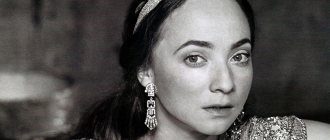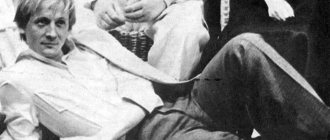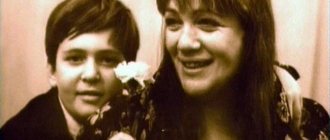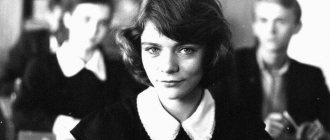The master's childhood
By Soviet standards, Ivan Pyryev had a simply perfect profile. The biography of this famous cultural figure met all the requirements of that time: he came from the small Altai town of Kamenya-on-Obi, from a simple peasant family and achieved everything on his own.
When the boy was three years old, his father died, and Vanyusha was taken in by his maternal grandfather Osip Komogorov. Despite his advanced age, the old man was able to replace the child’s father, instilling in him a strong, assertive character and a colossal ability to work, which greatly helped Pyryev in the future.
Death
In the last years of his life, the director worked literally to exhaustion. The death of Ivan Pyryev occurred on February 7, 1968, when he returned from filming the film “The Brothers Karamazov”. Ivan Alexandrovich died in his sleep from another heart attack. The subsequent autopsy showed that the man had recently suffered six heart attacks, all six on his legs, without stopping work on the film. Pyryev was buried at the Novodevichy cemetery.
Bust of the director in the city of Kamen-on-Obi, Altai Territory | Wikipedia
One of the streets in Moscow was named after him, and a memorial plaque was installed at the director’s house on Smolenskaya Street. But the main tribute to this illustrious man was paid in his homeland, in the city of Kamen-on-Obi. There are Pyryev streets and a memorial plaque, in addition, the Zvezda cinema bears his name, and city residents erected a bust of the great fellow countryman on the river embankment.
Participation in the First World War and Civil War
When World War I began, Ivan Pyryev was a thirteen-year-old teenager who, with youthful fervor, dreamed of proving himself in military affairs. Therefore, a year later he ran away from home and, boarding the first military train he came across, went to the front.
Despite his young age, Pyryev was able to prove himself and earn two St. George Crosses.
Revolution and events of 1917-1918. They found the young man in the hospital, where he was being treated for typhus. Having gotten into shape and assessing the current political situation, Ivan Pyryev decided to become a Red Army soldier. His biography at that moment changed radically: having joined the ranks of the builders of the new world (whom the communists considered themselves to be), an unknown boy from Altai got the chance to become one of the most famous people of his time.
Possessing a sonorous voice and good oratorical talent, the future director quickly rose to the position of agitator in the political department.
Ivan Pyryev and Lionella Pyryeva: personal life and creativity in the 50s -60s
Throwing himself into his work, he successfully films an adaptation of Dostoevsky’s novel “The Idiot.” However, his next work based on the same Dostoevsky’s novel “White Nights” failed.
During his last creative period, he was mainly engaged in social activities. Pyryev was elected to the Supreme Soviet of the USSR, and later worked as deputy chairman of the Great Art Council of the USSR Ministry of Cinematography. He was also the artistic director of Mosfilm and even its director.
He later married an actress, who became his last wife. This is Lionella Skirda. Ivan Pyryev and his women were a special topic in the conversations of the capital's bohemia. Lionella was 37 years younger than her husband. In addition, as people close to Pyryev claimed, he never stopped loving Lyudmila Marchenko, who rejected him. The director was in a state of depression, which young Lionella took advantage of.
Pyryev's acting career
Even when he was working as an agitator, Ivan Aleksandrovich Pyryev managed to feel the enormous influence that theatrical art and cinema have on people’s consciousness. Therefore, when the situation in the country returned to normal in the early 20s, the young man decided to become an actor himself. At first, he studied this profession in a theater studio at the Gubernia Trade Council. Here fate brought him together with Grigory Alexandrov.
A little later, while playing in a professional drama troupe in Yekaterinburg, the aspiring actor met the Moscow Art Theater artists who came there on tour. He was so fascinated by their skill that he decided to go to conquer the capital. Having collected his things, Pyryev and Alexandrov left for Moscow.
A talented young man with an assertive character soon managed to get a job at the First Workers' Theater of Proletkult. Here he was lucky enough to play in productions by such geniuses as S. Eisenstein and V. Meyerhold.
In 1923, Ivan Pyryev graduated from the acting department of GECTEMAS, but, following Grigory Alexandrov, he became interested in directing.
Youth
In 1915, Ivan Pyryev, together with one of the military echelons, went to the front. He fought in the 32nd Siberian Regiment and was wounded twice. For military services he received the St. George Cross of the 3rd and 4th degrees as a reward.
In May 1918, he became seriously ill with typhus. But the young strong body quickly coped with the disease. And immediately after recovery, he enlisted in the Red Army and the Bolshevik Party. His desire to succeed allowed him to rise from an ordinary Red Army soldier first to a political instructor and then to an agitator. It was then that Pyryev began his studies at the theater studio of the Gubernia Trade Union Council. There his fateful meeting took place with Grigory Alexandrov, who largely influenced Pyryev’s professional fate.
Ivan actively took part in the organization of the Ural Proletkult. In the city of Yekaterinburg, he took the stage name Altaisky and for some time was a member of a professional drama troupe. And in the summer of 1921, the Third Studio of the Moscow Art Theater toured in Yekaterinburg. Grigory Alexandrov and Ivan Pyryev were so delighted and amazed by their activities that they soon decided to go to Moscow.
First directorial works
Having graduated from the director's department of GEKTEMAS in 1925, Pyryev initially worked as an assistant director, however, having “get the hang of it,” he soon sat down in the director’s chair.
The maestro’s first work was “Stranger Woman,” but she did not distinguish herself in any way.
The next year, Ivan Aleksandrovich Pyryev decided to try himself in the satirical genre and made the film “Government Official”. However, the film, which criticized officials, was declared sabotage. In order not to lose his work, the director had to change it beyond recognition - as a result, the audience reacted coolly to the film. Career failures continued to haunt him in his work on the next project, from which he was simply removed.
Despite the adversity in his profession, in Pyryev’s personal life everything was going well. In the early 30s, he met a young actress, Ada Wojcik, whom he soon married. In 1931, the newlyweds had a son, Eric, in whom his father doted.
While working on the film Conveyor of Death, the director invited his wife to play the main role. Despite the fact that the film subsequently lay on the shelf for a long time, and when it was released, it had already lost its relevance, it became the director’s first work, which can be considered more or less successful.
In 1936, Ivan Pyryev made the adventure film “Party Card”. In it, he again takes his wife in the main role of drummer Anna Kulikova.
This experience of working together gave rise to a tradition according to which in all the films Ivan Pyryev and his women always worked together. Moreover, there were jokes in the acting community that from the films of this director you could find out who he was in love with at one point or another in his life.
As for “The Party Card,” despite the hostile attitude of the Mosfilm management towards it, Joseph Stalin was delighted with the film, and it was immediately released.
Meanwhile, clouds were gathering over the fate of the director himself. Soon he was fired from Mosfilm.
Filmography
Actor
- 1923 - Diary of Glumov (short film)
Director
- 1929 - Stranger Woman
- 1930 - Government official
- 1931 - The Last Village (suspended from work)
- 1933 - Conveyor of Death (“Product of Areas”)
- 1936 - Party card
- 1937 - The Rich Bride
- 1939 - Tractor drivers
- 1940 - Beloved girl
- 1941 - The Pig Farmer and the Shepherd
- 1942 - Secretary of the district committee
- 1944 - At 6 pm after the war
- 1947 — The Legend of the Siberian Land
- 1949 - Kuban Cossacks
- 1951 - We are for peace (with Joris Ivens)
- 1954 - Test of Loyalty
- 1958 - Idiot
- 1959 - White Nights
- 1962 - Our mutual friend
- 1964 - Light of a distant star
- 1968 - The Brothers Karamazov
Screenwriter
- 1928 - Torn Sleeves (with Boris Yurtsev)
- 1931 - The Last Village
- 1959 - White Nights
- 1962 - Our mutual friend (together with Vladlen Loginov)
- 1968 - The Brothers Karamazov
Artistic director
- 1960 - Quite Seriously (film almanac)
Marina Ladynina – Ivan Pyryev’s muse
Problems with work greatly affected the condition of the great director; he was nervous and took it out on his wife, which is why Ivan Pyryev’s personal life turned into hell.
Suddenly, fate provided him with the opportunity to change the situation and take a break from the problems that had piled up: the Kiev film studio “Ukrainfilm” invited Pyryev to film the musical comedy “The Rich Bride”.
Despite the fact that the director had never made films of this genre before, he decided to try. Moreover, by that time Grigory Alexandrov was already a recognized master of Soviet musical comedy, and Pyryev wanted to prove that he was no worse.
Ivan Pyryev decided to invite Marina Ladynina to play the main role in the project. Films with this young and unknown actress, which were released earlier, did not help her become famous. However, the great director had a special instinct for talent, and he saw that the girl would make a great actress, especially since Stanislavsky himself at one time called Marina the future of Soviet cinema. Besides all this, the master had one more reason to invite the charming laugher to the main role - he was in love with her.
The romance between Ladynina and Pyryev developed rapidly during the filming of “The Rich Bride.” Despite the fact that the director doted on the actress and was capable of any madness for her sake, on the set he was strict and sometimes merciless towards her.
After filming was completed, the lovers were forced to separate. Despite deep feelings for Ladynina, Ivan Pyryev could not leave the family because of his son Eric, whom he loved very much. Realizing that, apart from the role of a mistress, there was no other prospect for her in a relationship with the great director, the actress herself broke up with her lover, although she was pregnant with his child.
“The Rich Bride” became a real event in the cinema of the 30s. She helped the director gain the desired recognition. In addition, Pyryev realized that musical comedies about the lives of ordinary Soviet people were what the audience needed at that time. Therefore, he made this genre his role - and he was right.
Wife couldn't stand cheating
Directed by Ivan Pyryev.
Photo: Wikipedia “Kuban Cossacks”, “Tractor Drivers”, “Pig Farmer and Shepherd” - with his works director Ivan Pyryev carved a name for himself in the granite of Soviet cinema. That’s why he received six Stalin Prizes and was appointed head of Mosfilm. Power, recognition, unconditional authority and the most beautiful actresses nearby - and this is in the post-war 50s, when there are ruins all around, how can you resist temptation? Tempter, seducer, punisher, creator of blacklists!
And it all started with Frosya Burlakova - the beautiful actress Ekaterina Savinova, the future star of the film “Come Tomorrow”. Allegedly, it was Pyryev who noticed the VGIK student and invited the naive but married 22-year-old girl from Altai to play a role in “Kuban Cossacks.” And everything went perfectly for Savinova: Pyryev’s debut, at the same time an invitation to the Moscow Art Theater, all roads were open. But suddenly it was cut off. 13 years without a big role, tiny episodes without mention in the credits.
Actress Ekaterina Savinova. Still from the film “Come Tomorrow”
Savinova’s husband, director Evgeny Tashkov, who directed Come Tomorrow, is sure that this is all because she refused Pyryev. Moreover, she slapped her in the face on the set of “Kuban Cossacks,” in which Marina Ladynina, the wife of the libertine, played at that time. It was this turn from the gate that allegedly became fatal. Lack of demand destroyed Catherine - at the age of 43 she committed suicide.
Pyryev met the blonde Marina Ladynina, who played in “Kuban Cossacks” along with Ekaterina Savinova, in 1936, when he was married to another actress, the star of the 20s and 30s, Ada Voytsik. The novel was hidden from the general public, and when Ladynina gave birth to the director’s son Andrei, he divorced and started a new family with her. The actress shone in all of Pyryev’s films - “The Pig Farmer and the Shepherd”, “Tractor Drivers”, “Kuban Cossacks” and six more, became a People’s Artist of the USSR, and received five Stalin Prizes. But the closer Ladynina got to know her husband, the more rumors about the director’s love of love shrouded their home. In 1953, during the filming of the film “Test of Loyalty”, an order was issued by Goskino with a ban on filming their own wives - Pyryev was able to win the main role approved by Ladynina, but did not pass the test of fidelity. It turned out funny: only in 1955 Ladynina and Pyryev officially formalized their marriage, a year later they celebrated the 20th anniversary of their relationship, and soon divorced through the court.
Marina Ladynina. Still from the film “Kuban Cossacks”
There is no documentary evidence of the legend about Pyryev’s blacklist, but with Ladynina it was exactly the same as with the previous women of the head of Mosfilm: they stopped filming her. Although the actress herself explained that her age no longer allowed it, and she had no desire to play old women. They say she loved him to the end.
1939 film “Tractor Drivers”
Ivan Pyryev had a hard time with his breakup with Marina Ladynina and her departure. In 1938, she gave birth to a son, Andrei, and achieved her transfer to Odessa. The great director came to see her, but the beauty did not want to see him.
Meanwhile, Pyryev was offered to become the director of the musical comedy “Tractor Drivers”. He agreed with pleasure, but insisted that Ladynina play the main role in the new project. Having returned the actress to Moscow under the pretext of filming, he decided not to lose her anymore. Therefore, he filed for divorce from Ada and soon married his new muse.
As soon as it hit the screens, “Tractor Drivers” became a favorite movie for millions of television viewers. And Ladynina and Pyryev were awarded the Stalin Prize. It is noteworthy that for the first time in the history of this award it was awarded for a comedy.
Clara Rumyanova
According to the actress’s recollections, Pyryev offered 23-year-old Rumyanova a role in “A Test of Loyalty,” which she refused. This was unheard of impudence, so the director used all his influence to prevent the girl from being filmed.
Trained dogs began to identify people infected with Covid-19 with 100 percent accuracy
Ksenia Katalymova said that “Peace, Friendship, Chewing Gum” is a special series for her
Is there a chance of a comeback? It seems that life in Los Angeles is not for Meghan and Harry
He passed away in 1968, and only in the late 60s did fortune turn to Rumyanova. Thanks to her unique timbre, she has achieved outstanding success in scoring cartoons.
Wartime films
Having found his genre, as well as his muse, Ivan Pyryev began filming sparkling comedies almost every year. These films made millions of Soviet citizens laugh. In addition, most of them were awarded Stalin Prizes, which testified to the leader’s special love for Pyryev.
Despite the fact that the third joint film of the spouses, “Beloved Girl,” was not showered with awards, it still deserved the audience’s love.
The Great Patriotic War found the star couple working on the film “The Pig Farmer and the Shepherd.” As soon as mobilization was announced, Pyryev stopped filming and went to the front as a volunteer, fortunately he had painful experience. However, Stalin ordered the forty-year-old director to be returned to the rear along with the entire film crew. Ivan Pyryev was ordered to complete filming.
Despite the difficult times, “The Pig Farmer and the Shepherd” was received with a bang by the audience. She reminded them of a serene, peaceful life and inspired hope for its return. Soon after filming ended, the star couple was evacuated from Moscow.
During the evacuation, Pyryev was tasked with completing the filming of the film “Secretary of the District Committee” about the struggle of the Soviet people against the occupiers. Although this film brought him another Stalin Prize, it is not considered a particularly outstanding work by the director. The main role, according to tradition, was played by Marina Ladynina.
In the turning point of 1944, the director shot the film “At 6 pm after the war.”
And although it was released almost a year before the victory, its optimistic infusion was transmitted to millions of viewers across the country. It is interesting that at first Pyryev did not want to entrust the main role of Varya Penkova to his wife, because he believed that this was not her type, but Ladynina, who had long dreamed of playing a dramatic role, insisted. As a result, both were again awarded the “Stalinist Oscar”.
Biography[ | ]
Early years[ | ]
Ivan Pyryev was born in the village of Kamen, Barnaul district, Tomsk province (now the city of Kamen-on-Obi, Altai Territory) into a peasant family. In 1904, his father was killed in a fight, his mother went to the city to earn money, and Ivan was brought up in the large family of his Old Believer grandfather Osip Komogorov. From the age of eight he helped with housework, was a shepherd, and studied at a parochial school[2].
At the age of 11 he moved to Mariinsk to live with his mother, but after a quarrel with his stepfather he left home. He wandered around, worked as a cook, as an assistant in a sausage shop, as a cigarette seller on trains, and sold newspapers.
At the end of 1915, he boarded one of the military trains and went to the front. He fought, was wounded twice, and was awarded the Cross of St. George, 3rd and 4th degrees. In May 1918 he fell ill with typhus. After recovery, he enlisted in the Red Army. He served as an ordinary Red Army soldier, then as a political instructor, and in 1920 he was sent to Yekaterinburg as an agitator in the political department of the 4th railway brigade[3].
Actor[ | ]
At the same time, he studied at the theater studio of the Provincial Trade Union Council, where he met and became friends with Grigory Alexandrov. He became one of the organizers of the Ural Proletkult.
In Yekaterinburg, for three months he played small roles in a professional drama troupe under the pseudonym Altaisky
. At the end of the summer of 1921, the Third Studio of the Moscow Art Theater came to the city on tour. Pyryev and Alexandrov were so amazed by their art that they soon went to Moscow.
Since 1921, Pyryev served as an actor at the 1st Workers' Theater of Proletkult, where his teachers were Mikhail Chekhov and Sergei Eisenstein, but due to disagreements over the production of “Enough Simplicity for Every Wise Man,” he left the theater and for some time independently staged plays in clubs, until Vsevolod Meyerhold invited him to his place[2].
In 1923 he graduated from the acting department of the State Experimental Theater Workshop (GEKTEMAS) of Meyerhold, and studied at the directing department there[1]. Until 1925, he played at the Meyerhold Theater, where, in particular, he played the role of Alexis Bulanov in “The Forest”, then left it[2].
Director[ | ]
Ivan Pyryev, 1947
In 1925, he began his career in cinema, subsequently becoming the largest Soviet comedian. He worked as an assistant and assistant to directors Yuri Tarich and Evgeny Ivanov-Barkov at the Goskino, Proletkino and Soyuzkino film studios[2].
In 1929 he directed his first satirical film “Stranger Woman” based on the script by Nikolai Erdman and Anatoly Mariengof. It was followed by “Government Official”, which immediately went “on the shelf”, and Pyryev had to remount it with damage to its maintenance.
The anti-fascist film “Conveyor of Death” (1933) became the first sound film of “Mosfilm” and allowed Pyryev to begin preparing a large-scale film adaptation of “Dead Souls”: Mikhail Bulgakov was involved in the script, the music was to be written by Dmitry Shostakovich, the scenery was designed by Nikolai Akimov, and the role Vsevolod Meyerhold agreed to perform Plyushkina. However, after the famous article “Confusion Instead of Music” was published in the Pravda newspaper in 1936, the idea had to be abandoned[2].
In 1936, he directed the film “Party Card,” in which the poet Pavel Vasiliev served as the prototype for the main antihero. Despite the success of the film, the management of the film studio criticized it, Pyryev was suspended from work for two years, fired, after which he was forced to move to the Kyiv film studio, which marked the beginning of a new period in his work[2].
His musical comedies “The Rich Bride” (1937), “Tractor Drivers” (1939), “The Pig Farmer and the Shepherd” (1941), “Kuban Cossacks” (1949), and the romantic musical films “At 6 o’clock in the evening after the war” (1949) gained nationwide popularity. 1944) and “The Legend of the Siberian Land” (1947). In all these films, the main roles were played by his wife, actress Marina Ladynina.
In the last months of the Great Patriotic War, he traveled to the 2nd Ukrainian Front to conduct documentary and chronicle filming and took part in the preparation of a film about the storming of Berlin[2].
In the 1950-1960s, he moved away from comedy, becoming interested in film adaptations of the works of Fyodor Dostoevsky: “The Idiot” (1958), “White Nights” (1959), “The Brothers Karamazov” (1968). “The Idiot” was recognized as the best film of the year according to the magazine “Soviet Screen”, as was “The Brothers Karamazov”, during the filming of which Pyryev died, and the film was completed by the leading actors Kirill Lavrov and Mikhail Ulyanov[4].
Social activities[ | ]
In 1946, Pyryev became the first editor-in-chief of the Art of Cinema magazine in a long time, which had not been published since the beginning of the war. Through his efforts, the magazine was quickly revived; according to the memoirs of Rostislav Yurenyev, due to a lack of personnel, they were forced to publish articles under many pseudonyms[5]. Soon a campaign against cosmopolitanism began, but due to favorable reviews of the films of Eisenstein, Kozintsev and others, Pyryev was removed from his post in 1948 due to a “loss of vigilance”[5].
In 1954-1957 he was director of Mosfilm, then headed the creative association Luch there[1]. Pyryev began a large-scale restructuring of the studio’s film production, and in a short time managed to “manifold increase its production capacity, solve the sound problem, carry out a complete technical re-equipment of the entire production chain, including preparing the studio for a complete transition to the production of color films”[2].
In 1956, he initiated the creation of the Higher Directing Courses at Mosfilm, which he directed from 1957 to 1965[1].
Pyryev also actively patronized talented aspiring directors, including helping them pass censorship; It was he who called Grigory Chukhrai, Alexander Alov and Vladimir Naumov from the Dovzhenko studio to Mosfilm[6]. He practically forced documentarian Eldar Ryazanov to take on the production of the musical comedy “Carnival Night,” despite all his persistence, which marked the beginning of his career[7]. On the advice and patronage of Pyryev, Leonid Gaidai filmed the historical-revolutionary drama “Thrice Risen”, which helped him return to cinema after the “disgraced” comedy “Groom from the Other World”, and then loudly declare himself in the film anthology “Quite Seriously” (1961) , also created under the leadership of Pyryev[8].
After many attempts, he managed to achieve the organization of the Union of Cinematographers of the USSR together with Alexander Zguridi, who, being a professional lawyer, helped justify its economic independence from the state[9]. He headed the Investigative Committee until 1960.
Deputy of the Supreme Soviet of the USSR of the 3rd convocation, member of the CPSU since 1956[1].
Scandals and rumors[ | ]
Monument at the Novodevichy Cemetery in Moscow
There is a version that Pyryev destroyed the lives of young actresses who refused his claims, out of revenge, forbidding studios to film them. One of the victims of the so-called “black list” is Ekaterina Savinova, who starred in “Kuban Cossacks”: during an alleged business meeting, she slapped Pyryev in response to an attempt to court her. Because of this, other directors, such as Vsevolod Pudovkin and Grigory Chukhrai, inviting Savinova to audition, ended up refusing her, and the actress suffered a nervous breakdown[10]. Her husband Evgeny Tashkov confirmed in an interview that because of a certain influential director (he did not want to name him) Savinova lived for a long time without major roles, but at the same time denied rumors that this was the cause of the actress’s death (the cause was mental illness , which developed against the background of complications from brucellosis)[11]. In addition to Savinova, Klara Rumyanova[12], Lyudmila Marchenko and her friends - actors Vladimir Gusev and Alla Budnitskaya[13], as well as a number of other actresses are often included in the “list”.
As director Georgy Natanson wrote, “There were rumors about Pyryev that he was a hooligan, a foul-mouthed person, and even an anti-Semite. But in reality this was not confirmed. His friends were Mikhail Romm, Sergei Yutkevich, Alexander Stolper, Leonid Lukov...”[14].
Death[ | ]
On February 7, 1968, after returning from the filming of The Brothers Karamazov, he died in his sleep. A medical examination revealed six heart attacks suffered “on the legs” during work[4]. He was buried in Moscow at the Novodevichy cemetery (site 7).
At the VI Moscow International Film Festival (1969), Pyryev was posthumously awarded a special jury prize for his outstanding contribution to cinema[1].
“The Tale of the Siberian Land” and “Kuban Cossacks” are Pyryev’s last two comedies
After the victory and return to the capital of the USSR, the director actively got involved in his work.
In the following years, two more of his famous paintings were released - “The Tale of the Siberian Land” and “Kuban Cossacks”. These works again brought Ladynina and Pyryev Stalinist awards, but they also became the last comedies in the work of the great director.
The fact is that, being Stalin’s favorite, after the death of the leader and the debunking of his personality cult by Khrushchev, Ivan Pyryev found himself in disgrace. He was removed from directing work and “exiled” to Mosfilm.
Filmography[ | ]
Director[ | ]
- 1929 - Stranger Woman
- 1930 - Government official
- 1931 - Realized mistake (suspended from work)
- 1933 - Conveyor of Death
- 1936 - Party card
- 1937 - The Rich Bride
- 1939 - Tractor drivers
- 1940 - Beloved girl
- 1941 - The Pig Farmer and the Shepherd
- 1942 - Secretary of the district committee
- 1944 - At 6 pm after the war
- 1947 — The Legend of the Siberian Land
- 1949 - Kuban Cossacks
- 1951 - We are for peace (documentary) (jointly with J. Ivens)
- 1951 - Song of Youth (documentary) (jointly with D. Vasiliev)
- 1954 - Test of Loyalty
- 1958 - Idiot
- 1959 - White Nights
- 1961 - Our mutual friend
- 1964 - Light of a distant star
- 1968 - The Brothers Karamazov
Screenwriter[ | ]
- 1928 - Torn sleeves (together with B. Yurtsev)
- 1928 - Trouble (together with A. Aravsky)
- 1928 - Third youth (together with A. Aravsky)
- 1930 - Be like that (together with L. Solovyov)
- 1931 - Realized mistake (together with P. Ilyin)
- 1931 - Turner Alekseev
- 1933 - Conveyor of Death (together with V. Gusev and M. Romm
- 1951 - We are for peace (documentary) (jointly with A. Frolov)
- 1954 - Test of Loyalty (together with P. Tour and L. Tour)
- 1958 - Idiot
- 1959 - White Nights
- 1962 - Our mutual friend (together with V. Loginov)
- 1964 - Light of a distant star
- 1968 - The Brothers Karamazov
Actor[ | ]
- 1923 - Diary of Glumov (short film) - fascist clown
Artistic director[ | ]
- 1961 - Quite Seriously (film almanac)
Archive footage[ | ]
- 1978 - Ivan Pyryev (documentary)
- 2006 - Ivan Pyryev (from the series of programs on the DTV channel “How the idols left”) (documentary)
- 2006 - Three and a half lives of Ivan Pyryev (documentary)
- 2007 - 50th: Ivan Pyryev. Ivan the Builder (from the documentary series “The History of Film Bosses, or Builders and Rebuilders”)
- 2007 - Marina Ladynina. From passion to hatred (documentary)
- 2010 - Klara Luchko. Late Love (documentary)
- 2018 — Pyryev’s List (documentary); TVC
Bust of Pyryev installed in Kamen-on-Obi
- Honored Artist of the RSFSR (1942)
- People's Artist of the USSR (1948)
- Stalin Prize, first degree (1941) - for the film “Tractor Drivers” (1939)
- Stalin Prize, second degree (1942) - for the film “The Pig Farm and the Shepherd” (1941)
- Stalin Prize, second degree (1943) - for the film “Secretary of the District Committee” (1942)
- Stalin Prize, second degree (1946) - for the film “At six o’clock in the evening after the war” (1944)
- Stalin Prize, first degree (1948) - for the film “The Tale of the Siberian Land”
- Stalin Prize, second degree (1951) - for the film “Kuban Cossacks” (1949)
- St. George's Cross, 3rd degree
- St. George's Cross, 4th degree
- Three Orders of Lenin (1938, 1948, ?)
- Four Orders of the Red Banner of Labor (1944, 1950, 1951, 1961)[15]
- Medal "For Valiant Labor in the Great Patriotic War of 1941-1945"
- Medal "In memory of the 800th anniversary of Moscow"
- International Peace Prize (1952) - for the documentary film “We are for Peace” (1951)
- IFF in Marianske Lazne (Labor Prize and Prize for the best color film, the film “The Tale of the Siberian Land”, 1948)
- IFF of Workers in Czechoslovakia (Main Prize, film “The Tale of the Siberian Land”, 1948)
- International Film Festival in Karlovy Vary (Labor Prize, film “Kuban Cossacks”, 1950)
- All-Union Film Festival in Kyiv (Second Prize, film “The Idiot”, 1959)
- London International Film Festival (Diploma, film "White Nights", 1959)
- Edinburgh International Film Festival (Diploma, film "White Nights", 1959)
- Edinburgh International Film Festival (Diploma, film "The Idiot", 1959)
- IFF in Moscow (Special prize (posthumously), for outstanding services in the development of cinema, 1969)[16]
At the head of Mosfilm
In 1954, the great director became director of the main film studio of the USSR. Unexpectedly for many, and first of all for himself, he discovered a remarkable administrative talent.
Before Pyryev, about a dozen films were shot at the film studio a year, but now their number is close to a hundred. The new director set a course for transforming Mosfilm into Soviet Hollywood. He built new pavilions, purchased modern equipment and decorations. In addition, having a good understanding of people, Ivan Pyryev collected talented screenwriters, make-up artists, decorators, cameramen, directors and actors from all over the USSR.
To strengthen his power, in 1956 Pyryev joined the party and soon began to advocate for the creation of a Union of Cinematographers, which could unite all workers in this industry in the USSR. Khrushchev reacted negatively to this idea. Then the maestro waited until he left the country on a business trip and got his project approved by Nikita Sergeevich’s deputies. This is how the Union of Cinematographers was founded, headed by Ivan Pyryev himself.
However, he did not remain in this post for long, because due to his authoritarian style of management, many artists sought his resignation. And they succeeded in this.
Biography
early years
Ivan Pyryev was born in the village of Kamen, Barnaul district, Tomsk province (now the city of Kamen-on-Obi, Altai Territory) into a peasant family. In 1904, his father was killed in a fight, his mother went to the city to earn money, and Ivan was brought up in the large family of his Old Believer grandfather Osip Komogorov. From the age of eight he helped with housework, was a shepherd, and studied at a parochial school[2].
At the age of 11 he moved to Mariinsk to live with his mother, but after a quarrel with his stepfather he left home. He wandered around, worked as a cook, as an assistant in a sausage shop, as a cigarette seller on trains, and sold newspapers.
At the end of 1915, he boarded one of the military trains and went to the front. He fought, was wounded twice, and was awarded the Cross of St. George, 3rd and 4th degrees. In May 1918 he fell ill with typhus. After recovery, he enlisted in the Red Army. He served as an ordinary Red Army soldier, then as a political instructor, and in 1920 he was sent to Yekaterinburg as an agitator in the political department of the 4th railway brigade[3].
Actor
At the same time, he studied at the theater studio of the Provincial Trade Union Council, where he met and became friends with Grigory Alexandrov. He became one of the organizers of the Ural Proletkult.
In Yekaterinburg, for three months he played small roles in a professional drama troupe under the pseudonym Altaisky
. At the end of the summer of 1921, the Third Studio of the Moscow Art Theater came to the city on tour. Pyryev and Alexandrov were so amazed by their art that they soon went to Moscow.
Since 1921, Pyryev served as an actor at the 1st Workers' Theater of Proletkult, where his teachers were Mikhail Chekhov and Sergei Eisenstein, but due to disagreements over the production of “Enough Simplicity for Every Wise Man,” he left the theater and for some time independently staged plays in clubs, until Vsevolod Meyerhold invited him to his place[2].
In 1923 he graduated from the acting department of the State Experimental Theater Workshop (GEKTEMAS) of Meyerhold, and studied at the directing department there[1]. Until 1925, he played at the Meyerhold Theater, where, in particular, he played the role of Alexis Bulanov in “The Forest”, then left it[2].
Director
Ivan Pyryev, 1947
In 1925, he began his career in cinema, subsequently becoming the largest Soviet comedian. He worked as an assistant and assistant to directors Yuri Tarich and Evgeny Ivanov-Barkov at the Goskino, Proletkino and Soyuzkino film studios[2].
In 1929 he directed his first satirical film “Stranger Woman” based on the script by Nikolai Erdman and Anatoly Mariengof. It was followed by “Government Official”, which immediately went “on the shelf”, and Pyryev had to remount it with damage to its maintenance.
The anti-fascist film “Conveyor of Death” (1933) became the first sound film of “Mosfilm” and allowed Pyryev to begin preparing a large-scale film adaptation of “Dead Souls”: Mikhail Bulgakov was involved in the script, the music was to be written by Dmitry Shostakovich, the scenery was designed by Nikolai Akimov, and the role Vsevolod Meyerhold agreed to perform Plyushkina. However, after the famous article “Confusion Instead of Music” was published in the Pravda newspaper in 1936, the idea had to be abandoned[2].
In 1936, he directed the film “Party Card,” in which the poet Pavel Vasiliev served as the prototype for the main antihero. Despite the success of the film, the management of the film studio criticized it, Pyryev was suspended from work for two years, fired, after which he was forced to move to the Kyiv film studio, which marked the beginning of a new period in his work[2].
His musical comedies “The Rich Bride” (1937), “Tractor Drivers” (1939), “The Pig Farmer and the Shepherd” (1941), “Kuban Cossacks” (1949), and the romantic musical films “At 6 o’clock in the evening after the war” (1949) gained nationwide popularity. 1944) and “The Legend of the Siberian Land” (1947). In all these films, the main roles were played by his wife, actress Marina Ladynina.
In the last months of the Great Patriotic War, he traveled to the 2nd Ukrainian Front to conduct documentary and chronicle filming and took part in the preparation of a film about the storming of Berlin[2].
In the 1950-1960s, he moved away from comedy, becoming interested in film adaptations of the works of Fyodor Dostoevsky: “The Idiot” (1958), “White Nights” (1959), “The Brothers Karamazov” (1968). “The Idiot” was recognized as the best film of the year according to the magazine “Soviet Screen”, as was “The Brothers Karamazov”, during the filming of which Pyryev died, and the film was completed by the leading actors Kirill Lavrov and Mikhail Ulyanov[4].
Social activity
In 1946, Pyryev became the first editor-in-chief of the Art of Cinema magazine in a long time, which had not been published since the beginning of the war. Through his efforts, the magazine was quickly revived; according to the memoirs of Rostislav Yurenyev, due to a lack of personnel, they were forced to publish articles under many pseudonyms[5]. Soon a campaign against cosmopolitanism began, but due to favorable reviews of the films of Eisenstein, Kozintsev and others, Pyryev was removed from his post in 1948 due to a “loss of vigilance”[5].
In 1954-1957 he was director of Mosfilm, then headed the creative association Luch there[1]. Pyryev began a large-scale restructuring of the studio’s film production, and in a short time managed to “manifold increase its production capacity, solve the sound problem, carry out a complete technical re-equipment of the entire production chain, including preparing the studio for a complete transition to the production of color films”[2].
In 1956, he initiated the creation of the Higher Directing Courses at Mosfilm, which he directed from 1957 to 1965[1].
Pyryev also actively patronized talented aspiring directors, including helping them pass censorship; It was he who called Grigory Chukhrai, Alexander Alov and Vladimir Naumov from the Dovzhenko studio to Mosfilm[6]. He practically forced documentarian Eldar Ryazanov to take on the production of the musical comedy “Carnival Night,” despite all his persistence, which marked the beginning of his career[7]. On the advice and patronage of Pyryev, Leonid Gaidai filmed the historical-revolutionary drama “Thrice Risen”, which helped him return to cinema after the “disgraced” comedy “Groom from the Other World”, and then loudly declare himself in the film anthology “Quite Seriously” (1961) , also created under the leadership of Pyryev[8].
After many attempts, he managed to achieve the organization of the Union of Cinematographers of the USSR together with Alexander Zguridi, who, being a professional lawyer, helped justify its economic independence from the state[9]. He headed the Investigative Committee until 1960.
Deputy of the Supreme Soviet of the USSR of the 3rd convocation, member of the CPSU since 1956[1].
Scandals and rumors
Monument at the Novodevichy Cemetery in Moscow
There is a version that Pyryev destroyed the lives of young actresses who refused his claims, out of revenge, forbidding studios to film them. One of the victims of the so-called “black list” is Ekaterina Savinova, who starred in “Kuban Cossacks”: during an alleged business meeting, she slapped Pyryev in response to an attempt to court her. Because of this, other directors, such as Vsevolod Pudovkin and Grigory Chukhrai, inviting Savinova to audition, ended up refusing her, and the actress suffered a nervous breakdown[10]. Her husband Evgeny Tashkov confirmed in an interview that because of a certain influential director (he did not want to name him) Savinova lived for a long time without major roles, but at the same time denied rumors that this was the cause of the actress’s death (the cause was mental illness , which developed against the background of complications from brucellosis)[11]. In addition to Savinova, Klara Rumyanova[12], Lyudmila Marchenko and her friends - actors Vladimir Gusev and Alla Budnitskaya[13], as well as a number of other actresses are often included in the “list”.
As director Georgy Natanson wrote, “There were rumors about Pyryev that he was a hooligan, a foul-mouthed person, and even an anti-Semite. But in reality this was not confirmed. His friends were Mikhail Romm, Sergei Yutkevich, Alexander Stolper, Leonid Lukov...”[14].
Death
On February 7, 1968, after returning from the filming of The Brothers Karamazov, he died in his sleep. A medical examination revealed six heart attacks suffered “on the legs” during work[4]. He was buried in Moscow at the Novodevichy cemetery (site 7).
At the VI Moscow International Film Festival (1969), Pyryev was posthumously awarded a special jury prize for his outstanding contribution to cinema[1].
Pyryev’s new muse - Lyudmila Marchenko
Meanwhile, a new love came to the already middle-aged master of Soviet cinema. She became the young actress Lyudmila Marchenko.
Marina Ladynina was getting old and could no longer play the main characters in her husband’s films. When Pyryev decided to film Dostoevsky’s “The Idiot,” his wife began asking for the role of Nastasya Filippovna. But Pyryev sharply refused and cast Yulia Borisova in this role. Because of this resentment, relations between the spouses became tense. When Ladynina heard gossip about her husband’s passion for a young actress, the family life of the star couple turned into a nightmare.
Meanwhile, the director’s new muse, who received the main role in his film “White Nights,” was in no hurry to reciprocate his feelings. Despite the courtship and luxurious gifts, the girl completely refused to marry the all-powerful Pyryev, although her entire future career depended on his one word.
For several years, Ivan Alexandrovich did not leave the obstinate beauty alone. Having learned that she was getting married, he even destroyed her apartment. But all this turned out to be useless, and gradually Pyryev lost interest in Marchenko.
However, relations with Ladynina were hopelessly damaged, and soon the star couple filed for divorce. No one knows for sure who initiated this. However, they said that Marina Ladynina, in a fit of jealousy, wanted to write a denunciation against her husband, but changed her mind. Her husband did not forgive her for this and divorced, taking their common son with him. Other acquaintances insist that after Marchenko’s refusal, Pyryev wanted to make peace with his wife, but she did not forgive him and filed for divorce.
After the separation, the former spouses never saw each other again. There were rumors that Ivan Alexandrovich forbade Ladynin to appear in films. But many doubt this, since after the breakup the actress worked for a long time at the Film Actor’s Studio Theater and went on concerts around the country. In addition, in 1963, the director’s eldest son, Eric Pyryev, filmed her in his documentary “Dunaevsky’s Melodies.”
Loser director
Unprepossessing, skinny and not very attractive. A director who has directed several films that few people know about. This is how Pyryev was in 1934. What attracted her to him? Many years later, Ladynina would say this about the young actress Lyudmila Marchenko:
I feel sorry for her, I know how charming he can be, how he can make you fall in love with him
Note that she said this about a girl who, one might say, stole her husband from her.
In 1935, Marina Ladynina’s life also did not have the brightest streak. For an affair with a foreigner who was head over heels in love with her, the actress was summoned to the Lubyanka several times, and then fired from the theater. In order to feed herself, she washed clothes for her colleagues.
So. A failed director and a laundress actress. What can come out of such a creative tandem? It seems like nothing good.
However, the stars miraculously aligned, and a duet was born that would become a symbol of Soviet cinema of the 40s.
Lionella Skirda - the last love of the master of Soviet cinema
Despite the fact that for many years Ivan Pyryev and his women were the source of numerous witticisms circulating among actors, after breaking up with Ladynina, the director decided to leave his love affairs and focus on work.
In 1964, the maestro made a film about tragic love during the war - “The Light of a Distant Star.” He gives the main role to the young actress Lionella Skirda, with whom he unexpectedly falls in love. Soon this girl becomes his wife.
Despite the gossip surrounding this union, the young actress became a faithful friend and consolation for the elderly master.
Personal life
In 1933, on the set of the film “Conveyor of Death,” the director met actress Ada Voytsik, who changed the status of Ivan Pyryev’s personal life and became his first wife. A son, Eric, was born into the family, but the child could not prevent Ada from leaving her husband when he started having problems with the management of Mosfilm. In addition, Ivan Aleksandrovich was torn between feelings for his first wife and obvious sympathy for the star of his comedies, Marina Ladynina, who turned out to be the only person who supported Pyryev in difficult times. As a result, the man chose Marina.
Ladynina was with him for more than 20 years and all these years remained invariably the main actress of his films. The couple had a son, Andrei Ladynin, who later became a director. It is interesting that Pyryev and Ladynina officially got married only in 1955, and a year later they celebrated their 20th anniversary of marriage. However, soon there was a break in the family. In the last joint film, “A Test of Loyalty,” Marina played a woman whose husband leaves her, and this role turned out to be prophetic. The fact is that Ivan Aleksandrovich became interested in a young student, Lyudmila Marchenko, whom he filmed in White Nights. He left his wife because of this girl, despite the almost 40-year age difference.
Ladynina, who once supported Pyryev in the moments of his collapse, could not forgive the betrayal and did not maintain any relationship with him until the end of her life. Apparently, the woman said a lot of unpleasant words to her ex-husband, since Ivan Aleksandrovich, with the help of his authority, forbade directors to film Marina, and she was no longer in demand. However, the director himself did not build happiness with Lyudmila Marchenko: her relatives opposed this relationship, and the girl chose to accept the advances of a younger suitor for her heart.
The last muse of the great director was the young actress Lionella Skirda. She became his legal wife, played in Pyryev’s films “The Light of a Distant Star” and “The Brothers Karamazov” and until the end of Ivan Alexandrovich’s days she was very devoted to him. Lionella later married the famous actor Oleg Strizhenov, with whom she still lives.
All the people who worked with Pyryev noted that he was a man of great temperament and emotionality, but at the same time he was distinguished by charm and attracted people to him. However, the director was very strict on the set, for which he received the nickname “Ivan the Terrible.”
The last years of the great director
Since the second half of the sixties, Ivan Pyryev was sick a lot, but did not leave his job. In 1967, he decided to film the novel The Brothers Karamazov.
Having gathered a whole galaxy of outstanding actors on the set (Kirill Lavrov, Mikhail Ulyanov, Andrei Myagkov, etc.), the director set to work. But he was not destined to complete it, because one February evening in 1968, having returned from work, Ivan Pyryev went to bed and never woke up.
Subsequently, the film was completed by the performers of the two main roles - Kirill Lavrov and Mikhail Ulyanov.
last love
This was followed by another film, “Kuban Cossacks,” which became a cult classic. This lyrical comedy, in which M. Ladynina played one of her best roles, is still very popular among movie lovers.
This was one of their last collaborations. Ivan Pyryev, whose personal life had previously been the subject of discussion on all the sidelines, again amazed everyone with his love of love.
Having started work on the film “Test of Loyalty,” neither Pyryev nor Ladynina could have imagined that the plot of the film would become prophetic for them. Marina Alekseevna played a woman whose husband leaves her. It was at this time that Ivan Alexandrovich met the young actress Lyudmila Marchenko.
He, being a mature man, falls madly in love with a young beauty, showers her with gifts and new roles. However, Lyudmila, to whom he was old enough to be a father or even a grandfather, did not answer Pyryev’s claims either “yes” or “no”, fearing a categorical refusal to provoke the wrath of a high-ranking boss. Then he returns to the family, then leaves again. And this went on for several years, until Marina Alekseevna Ladynina filed for divorce. The reaction of Pyryev, who at that moment realized that Marchenko was not going to connect his life with him, was extremely aggressive. He threatened that Ladynina would lose her job: he would make sure that not a single director would invite her. However, she, having a strong character, still divorced the marriage. And Ivan Pyryev, a biography whose personal life began to be discussed at the top of the party, carried out his threats, and Ladynina was almost forgotten. He was called on the carpet to stop pursuing actress Lyudmila Marchenko, but he said that she had become his last love and without Lyunechka (as he called Lyudmila), he simply would not be able to work. It was then that Marchenko gets married, which causes Pyryev’s uncontrollable anger. He treats her the same way as he did with Ladynina, by order he forbids directors to invite her to act in films and creates obstacles in theatrical work.
Children of Ivan Pyryev
The great director had two sons, and both of them followed in their father's footsteps.
The eldest, Eric Pyryev, thanks to his father’s connections, was able to work as a director, although he failed to reach the level of Ivan Alexandrovich.
Eric survived his father by only two years and died in 1970.
The son of Marina Ladynina and Ivan Pyryev, Andrei, also followed in his father’s footsteps. His directorial career began after the death of Ivan Alexandrovich, but was not very successful. He made 5 films, most of which were detective stories. Andrey Pyryev died in 2011.
The fate of Ivan Pyryev can be considered a living illustration of the famous slogan from the Internationale: “He who was nothing will become everything.” Throughout his life, this brilliant man managed to do a lot. And this is primarily his own merit. As for his personal life, which has always been discussed no less actively than Pyryev’s work, only a person who does nothing makes mistakes, while everyone else is doomed to find their way to the stars, making their way through thorns.
Marina Ladynina: wife and muse
The next comedy, “Tractor Drivers,” was slightly similar in plot to the previous one. However, here the main character, who was again embodied on the screen by M. Ladynina, was more strong-willed and energetic. And again a success that made Pyryev and Ladynina one of the most popular cultural figures of that time.
It should be noted that having fallen in love with Marina Ladynina, Ivan Aleksandrovich left his first wife Ada Voytsik, but his love for his son Eric did not allow him to leave completely. Then he returned to his first wife several times. But new love still prevailed. Ladynina was a real muse for Pyryev. She played the leading roles in nine of his films, most of which were a resounding success with audiences. Ada Wojcik suffered greatly. It was rumored that she even wanted to commit suicide. But then time dulled the pain and resentment. She resigned herself.
Ivan Pyryev developed a unique poetics of conflict-free lyrical comedy, which glorified work and life for the good of the Motherland. He successfully embodied it in “The Rich Bride” and “Tractor Drivers”. It was this interpretation of the comedy genre that became a kind of standard for Soviet comedy in the mid-20th century.











